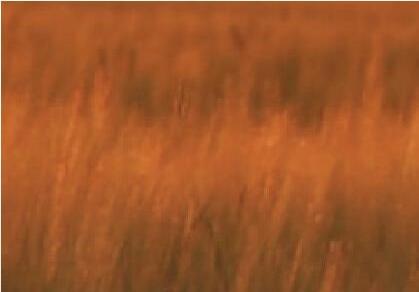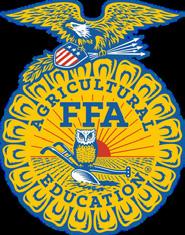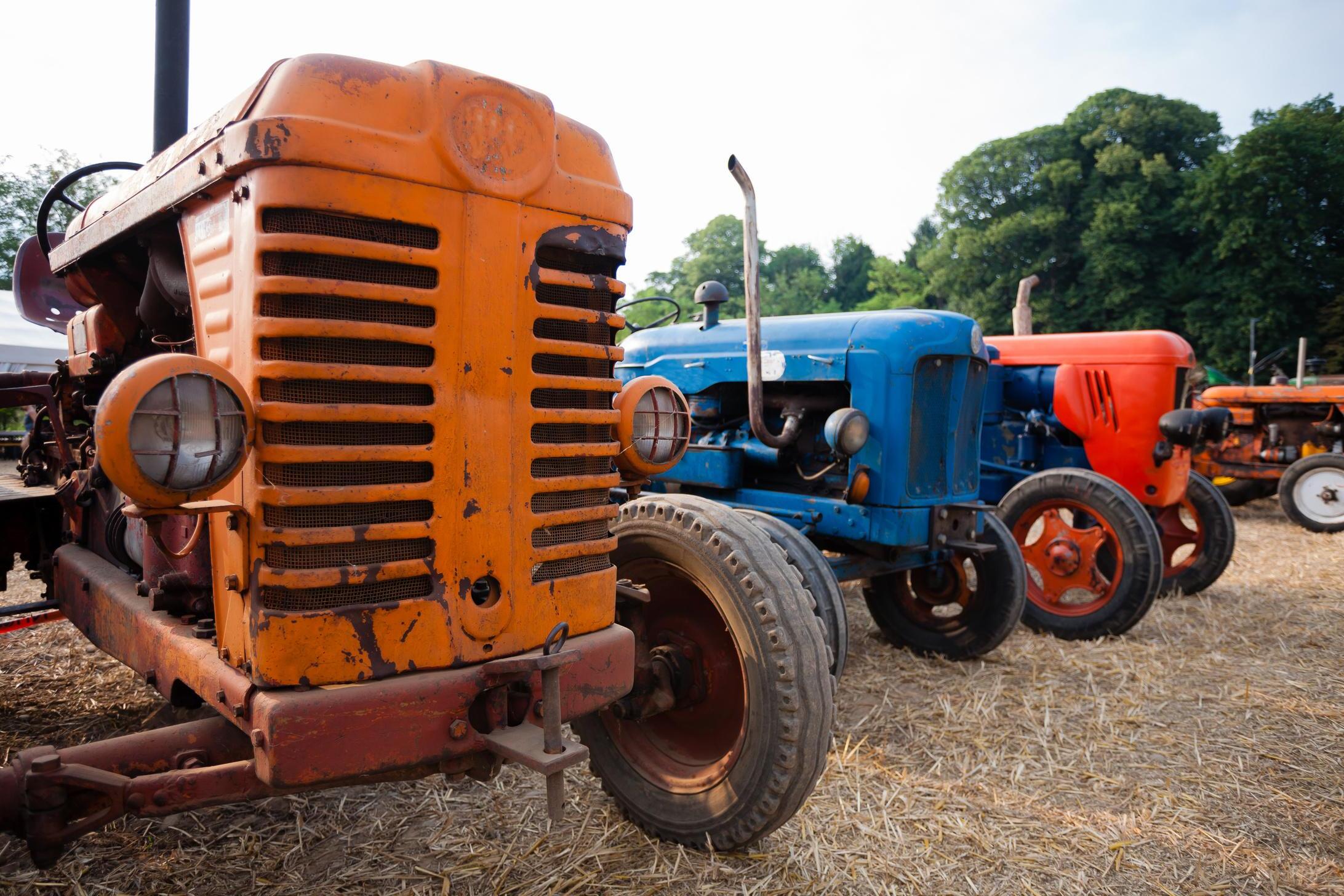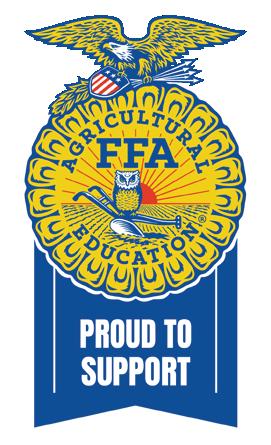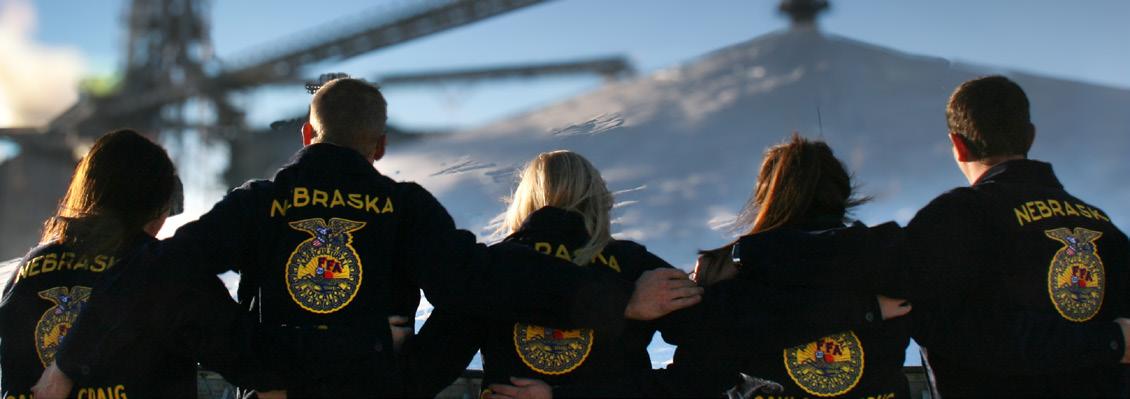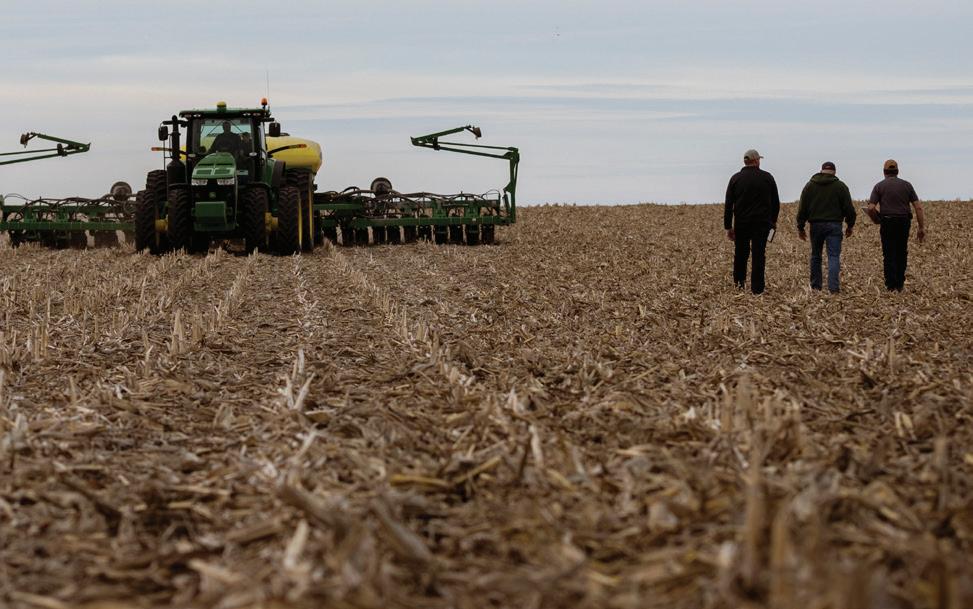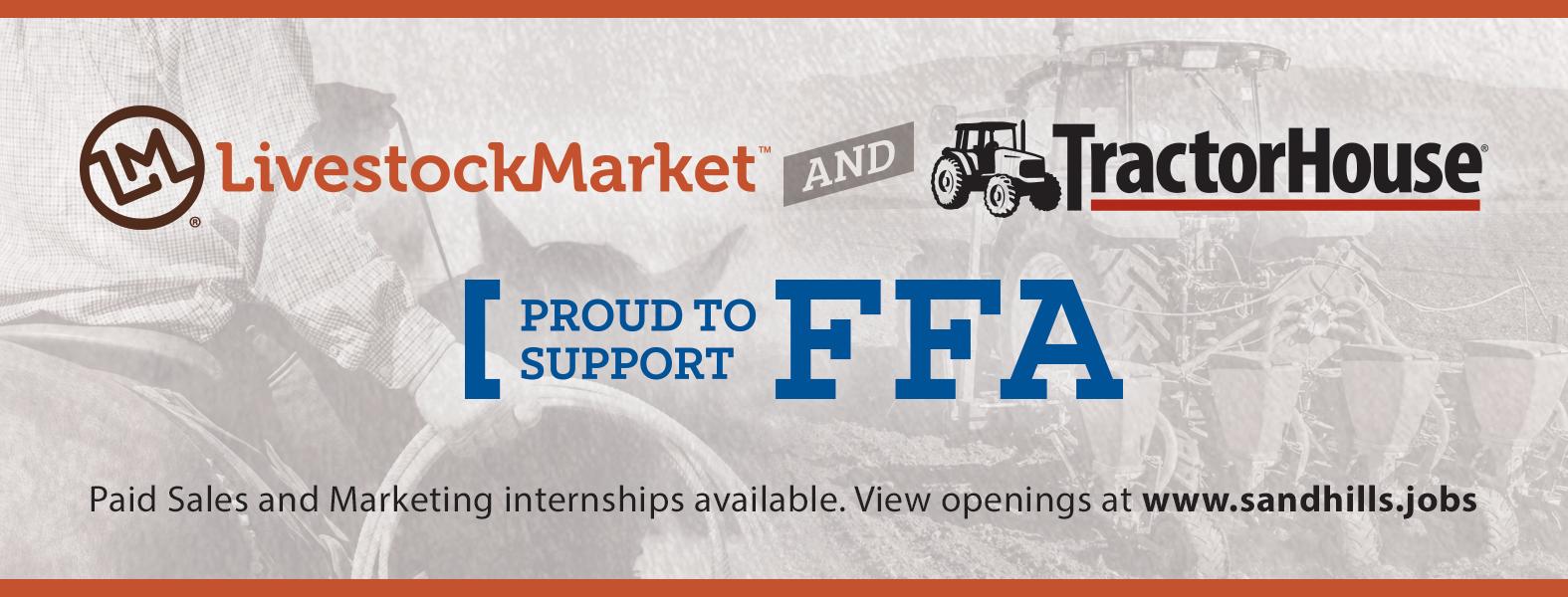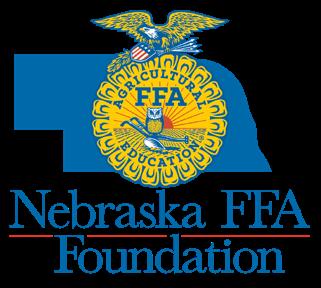Nebraska Agricultural Education & FFA Handbook

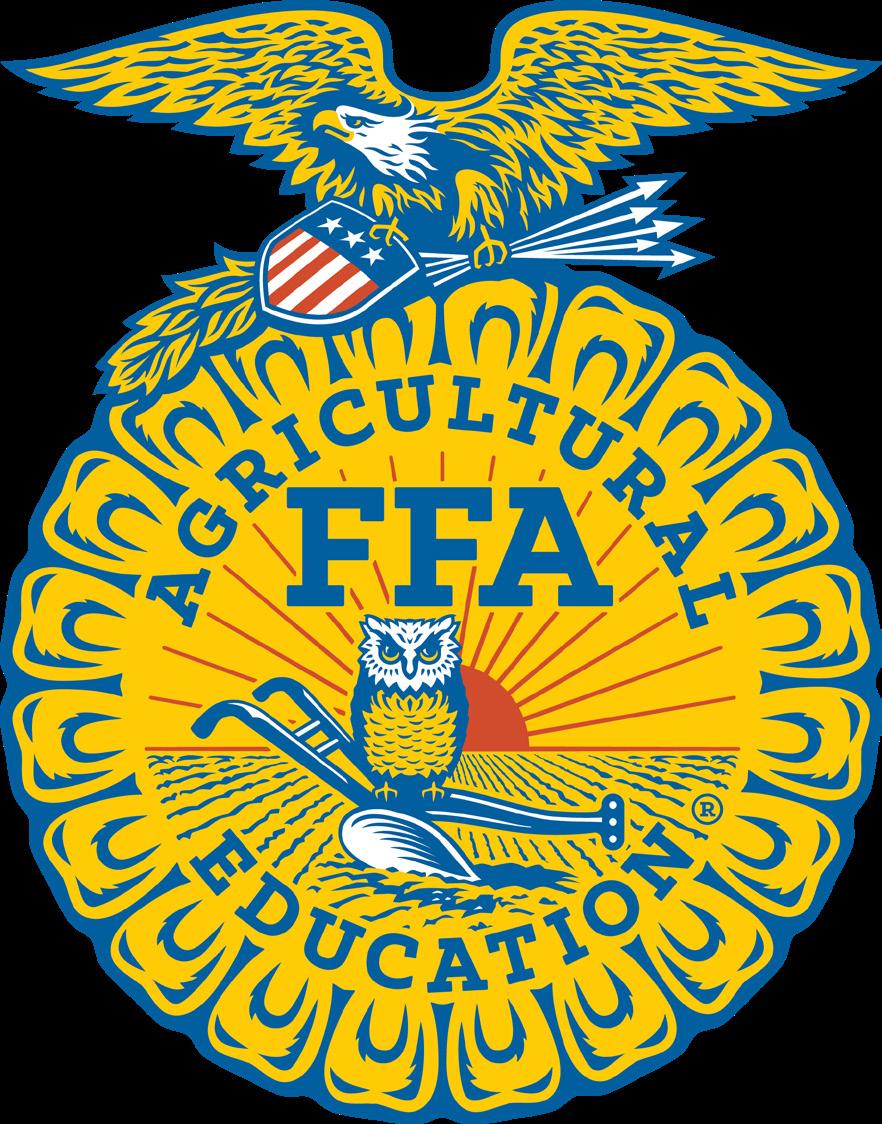





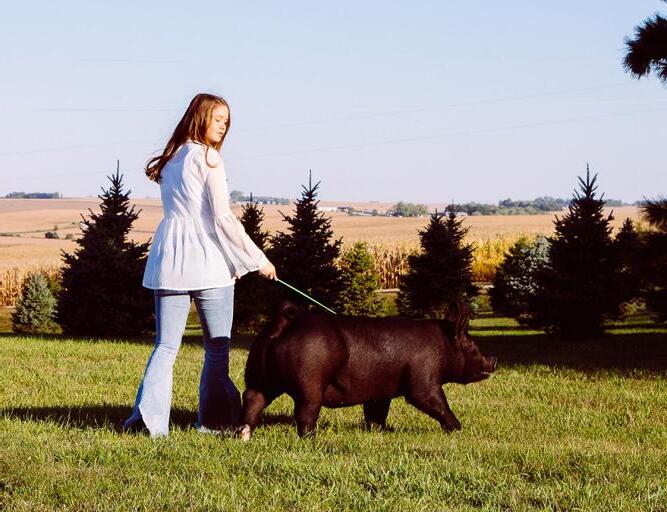
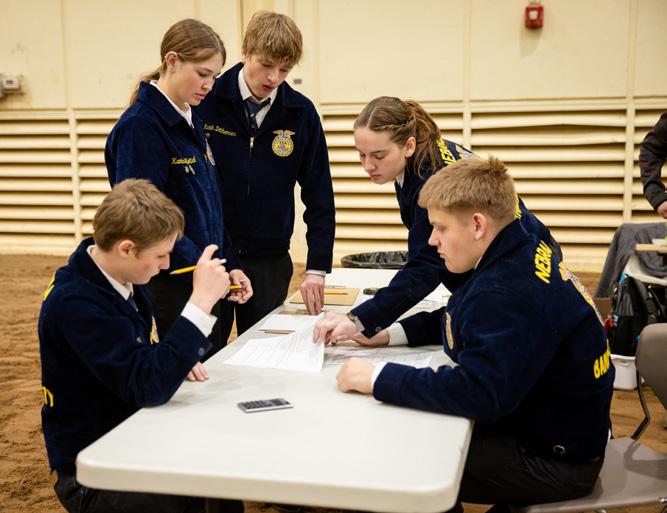
Agricultural education is a schoolbased program that prepares you for careers in agriculture, food and natural resources.
The three components of agricultural education tell our story.
The lead circle and base foundation in the agricultural education system is formal classroom and laboratory instruction in 23 available courses.
Agriculture teachers work hard to make these classes experience-based and relevant to careers in the agriculture industry.
Agricultural education students are guided in developing a Supervised Agricultural Experience (SAE) to develop skills and gain knowledge of the agriculture industry.
Student SAEs include research projects, job shadowing experiences, jobs held or businesses started by students. All SAEs relate directly to agriculture.
FFA is the organization for students enrolled in agricultural education and seeks to benefit students by developing their potential for premier leadership, personal growth and career success through agricultural education.
FFA allows students to compete, participate and receive recognition in agricultural career skills development and leadership programs.

Agricultural education is taught by a certified agriculture teacher who holds a degree in agriculture from a college or university. They are dedicated to professional development and staying up-to-date on the rapidly changing global agriculture industry.
You will learn about the Agriculture, Food and Natural Resources career pathways in your introductory course. You’ll then continue on to intermediate and capstone level courses, building upon what you learned the previous year. The pathways provide a guide for you to follow what interests you most! Your agriculture teacher will also integrate FFA and Supervised Agricultural Experience concepts and principles into your classes.
Introduction to Agriculture, Food & Natural Resources (introductory course taken by all agricultural education students)
• intermediate course + capstone course
ANIMAL SYSTEMS PATHWAY
• Animal Science
+ Large Animal Management
+ Small Animal Management
+ Veterinary Science
+ Biotechnology
POWER, STRUCTURE & TECHNICAL SYSTEMS PATHWAY
• Power, Structure & Technical Systems Fundamentals
• Welding
+ Power, Structural & Technology Systems
+ Precision Agriculture and Engineering
+ Metals & Fabrication
ENVIRONMENTAL & NATURAL RESOURCES SYSTEMS PATHWAY
• Environmental & Natural Resources
+ Environmental & Natural Resources Management
+ Wildlife Management
FOOD PRODUCTS & PROCESSING SYSTEMS PATHWAY
• Food Science & Safety
+ Food Products and Technology
AGRIBUSINESS SYSTEMS PATHWAY
• Agribusiness
+ Agricultural Economics
+ Agricultural Management & Entrepreneurship
+ Agricultural Sales & Communications
PLANT SYSTEMS PATHWAY
• Plant Science
+ Crop Management/ Agronomy
+ Nursery & Landscape
+ Floriculture
+ Biotechnology
DIVERSIFIED AGRICULTURE SYSTEMS PATHWAY
• Animal Science
• Plant Science
• Agribusiness
• Food Science and Safety
• Food Production, Nutrition and Health
• Environmental and Natural Resources
• Welding
• Power, Structural & Technical Foundations
Workers use technology to coordinate all activities that contribute to production, processing, marketing, distribution, financing and development of agricultural commodities.
Agricultural Loan Officer • Agribusiness Manager • International Ag Marketing Specialist • Marketing Communications Manager • Financial Manager
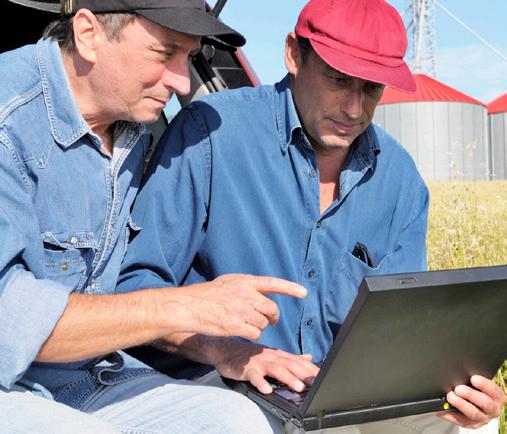
Workers study genetics, nutrition, reproduction, growth and development of food and companion animals. They inspect and grade livestock food products, purchase livestock or work in sales or marketing.
Geneticist • Nutritionist • Physiologist • Biomaterials Engineering • Farm and Ranch Managers
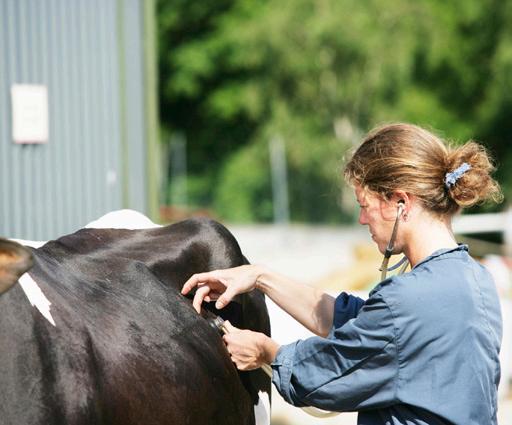
Workers in diversified agriculture can study all programs of study to develop skills to work with plants, animals, food, environment, natural resources and power, structural and technical areas.
Farmer • Rancher • Sales Representative • Farm and Ranch Managers • Entrepreneur • Machinery Operator
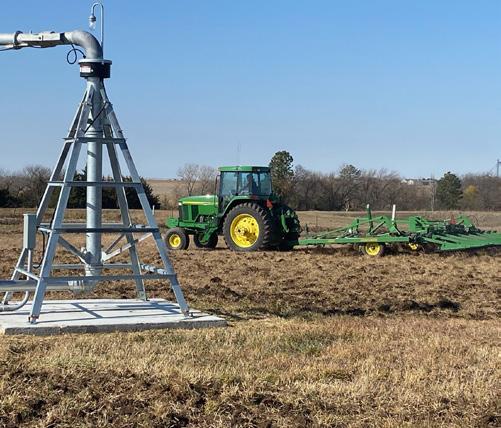
ENVIRONMENTAL AND NATURAL RESOURCES SYSTEMS

Workers are involved in pollution control, recycling, waste disposal and public health. They conduct hazardous waste management studies and analyze environmental research projects.
Career Ideas
Environmental Engineer • Hazardous Materials
Handler • Health and Safety Sanitarian • Toxicologist
• Conservation Officer • Water Quality Manager
• Forestry Scientist • Fisheries Scientist • Wildlife Manager

Workers discover food sources and develop ways to process, preserve, package or store food. They create new food products and inspect food processing to ensure food safety.
Career Ideas
Biochemist • Food Broker or Engineer • Food Science Technician • Quality Assurance Specialist

PLANT SYSTEMS
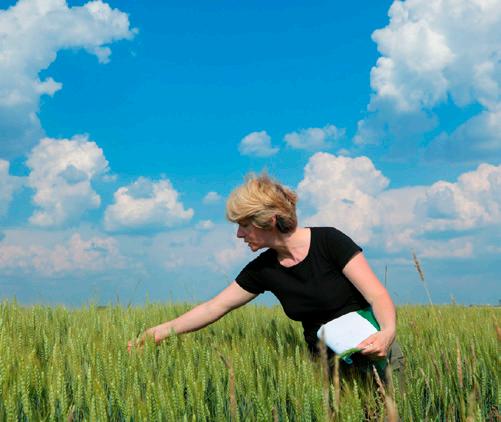
Workers apply knowledge of engineering, power hydraulics, pneumatics, electronics, structures and controls to agriculture, and develop ways to improve the processing of agricultural products.
Career Ideas
Agricultural Engineer • Diesel Mechanic • Welder Farm Equipment Mechanic • Global Positioning Technician
Workers develop ways to improve the nutritional and aesthetic value of plants and quality of seeds.
Career Ideas
Agronomist • Entomologist • Plant Scientist • Golf Course Superintendent • Landscape Architect
Our population is growing like never before. There are 7 billion mouths to feed and our population is expected to grow to 9 billion people by 2050. Jobs and careers in all sectors of agriculture will be vital to keeping up with the global demand for agricultural and food production.
To feed everyone, we’ll need to produce as much food in the next 50 years as we have produced the last 10,000 years.
PAST 10,000 YEARS = NEXT 50 YEARS
In the U.S., one part of this challenge is finding enough workers to fill more than 20 million agricultural jobs.
300+ agricultural careers employ more than 23 million people
only 2 are farmer and rancher
AMERICAN AGRICULTURE IS COMPOSED OF MORE THAN 300 CAREERS RELATED TO THE PRODUCTION OF FOOD. OF THESE, ONLY TWO ARE “FARMER AND RANCHER”.
OUT OF 57,900 AVERAGE JOB OPENINGS PER YEAR FOR AGRICULTURALLY-BASED 4-YEAR COLLEGE GRADUATES, ONLY 35,400 GRADUATES ARE EXPECTED, RESULTING IN A 39% GAP IN THE LABOR SUPPLY.

Sophia Svanda is the Marketing and Communications Manager for Frontier Cooperative. In her role, she captures and communicates Frontier Cooperatives’ mission and work through social media and marketing materials. Sophia was a member of the Conestoga FFA Chapter, “Being involved in FFA showed me that there is a place in agriculture for everyone. I didn’t grow up with a “traditional” ag background, and because of that I dismissed the idea of a career in agriculture being a possibility for me.” she said. “The FFA Organization helped connect me with industry professionals who encouraged me to find my place within the industry. If it weren’t for my FFA experience, I probably would have overlooked the career opportunities that are available in agriculture.”

Eric Koop is a former member of the Wallace FFA Chapter and is now a Commercial Application Sales Specialist for AKRS Equipment. He said “FFA gave me multiple highlevel opportunities to engage in Ag related fields that I was interested in. Those Experiences are what influenced me to take the career path I did without questioning my decision.” Eric shares that being a part of the Wallace FFA Chapter was one of his favorite experiences.“Our FFA Advisor, Lisa Kemp is awesome. Not only did she inspire me to find my place in the Ag industry, but she also showed me a prime example of what it takes to be a leader. Seeing what she has done, and continues to do, with our program at Wallace is awesome. I’m proud to have been a part of it.” He encourages current FFA members to “Utilize the tools and recourses FFA provides you. These opportunities and experiences will only help drive you to be better at whatever it is you want to do.”
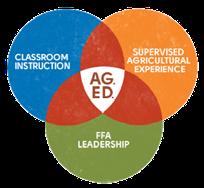
A Supervised Agricultural Experience (SAE) is an experience-based program in which you gain work-based learning experiences and develop skills in agriculture career areas that interests you.
There are two key steps to getting started:
STEP 1: Visit with your agriculture teacher about your career interests.
STEP 2: Create a program that develops skills in your areas of interest.
SAEs are categorized as either a Foundational SAE or an Immersion SAE.
Foundational SAEs include instruction for all students each year related to:
Career exploration and planning
Personal financial planning and management
Workplace Safety
Employability skills for college and career readiness
Agricultural literacy
Immersion SAEs are identified in one of the following five types:
Entrepreneurship/Ownership: In this SAE, students create, own and operate a business which provides good and/or services to the marketplace. Their business can range from starting a mowing service to developing mobile apps. They make the operational and risk management decisions on how goods and/or services are provided.
Placement/Internships: In a placement SAE, students work in an agriculture-related business, but do not own the business. An internship SAE provides a more targeted experience that focuses on meeting specific training needs based on an educational training plan.
Research (Experimental, Analytical, Invention): Students follow the scientific process and accepted best practices for conducting research. They complete a research plan and conduct peer reviews, providing
a summary presentation on their research. Research can be experimental in nature, analyzing why or how something occurs, or applying engineering design process to create a new product or service.
School Based Enterprises: This is an entrepreneurship SAE that involves a group of students working cooperatively to create a business. The business is student-led and provides goods or services operated from the school campus utilizing facilities, equipment and other resources provided by the agricultural education program.
Service Learning: Service learning is where a student or a team of students work toward meeting a need in the school or community. They design and carry out a project to provide a benefit to an organization, group or individuals within the community.

THE MISSION:
The National FFA Organization is dedicated to making a positive difference in the lives of students by developing their potential for premier leadership, personal growth and career success through agricultural education.
THE MOTTO:
Learning to Do, Doing to Learn, Earning to Live, Living to Serve.
THE COLORS:
In 1929, at the second National FFA Convention, the delegates adopted National Blue and Corn Gold as the official colors of the FFA. This became the colors of one of the most recognizable symbols of FFA, the blue corduroy jacket.
THE EMBLEM:
The FFA Emblem was designed and adopted in 1933 as part of the official jacket. The emblem itself carries much meaning to those involved in agricultural education.


Nebraska has nearly 12,000 FFA members in 214 chapters
FFA was started in 1928 when 33 ag students gathered in Kansas City to solidify support for agricultural education. Nebraska was the sixth state to charter in 1928.
FFA has grown to over 945,988 members in 9,163 chapters in all 50 states, Puerto Rico, and the U.S. Virgin Islands.
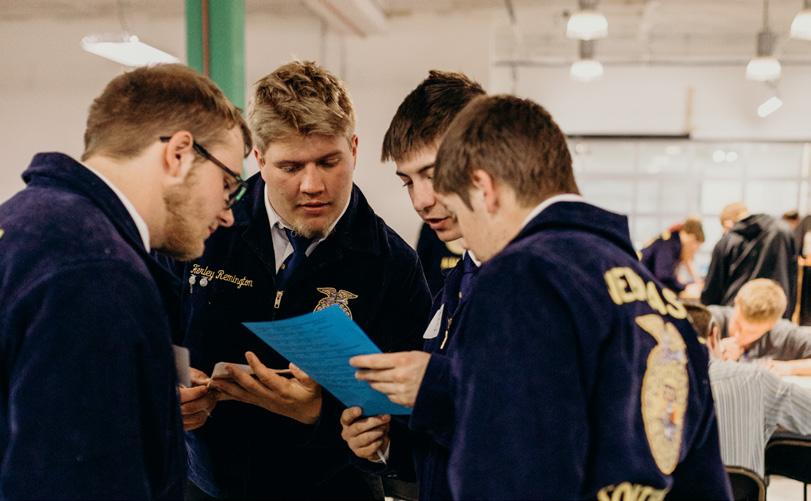
FFA offers exciting opportunities to gain leadership and career skills while making new friends from around the state. Leadership conferences combined with competitive events take place throughout the year.
Each fall, Nebraska FFA members are invited to attend a highenergy conference with industry representatives. Students get the opportunity to engage with industry professionals from the seven agriculture, food and natural resource career pathways. Industry professionals lead hands-on, interactive workshops and develop relationships with future employees.
COLT is for FFA chapter officers to learn how to effectively serve their chapters. Conferences are held throughout May. The focus is on individual leadership skills as well as how to work as a chapter officer team. Officers engage in experience-based leadership activities, share and learn great ideas and create an action plan for their year of service.
Each fall, leadership conferences such as EDGE are held in various regions of the state to provide students at all levels the chance to improve their leadership skills. Participants get to know other students and begin understanding what is possible in agricultural education and FFA
This conference prepares leaders to be advocates of the chapter for current and potential members, as well as community stakeholders. The two-day conference is held in Kearney in mid-February.
Nebraska FFA State Convention is an event for Nebraska’s FFA members, advisors, agriculture teachers, parents, sponsors, donors and guests to attend annually in Lincoln.
The convention is held at Pinnacle Bank Arena, hotels in Lincoln and University of Nebraska.
FFA members have the opportunity to attend leadership workshops, participate in competitive events, listen to motivational speakers and state officer retiring addresses, watch and receive awards, attend business tours and attend the expo and career fair.
Can you think of another program where students can develop essential leadership, life and career skills, earn money and be recognized on local, district, state and national levels for these efforts? FFA has it!
FFA members can earn degrees as they progress through the phases of their leadership, academic and career skills development. Each degree advancement has specific requirements that must be achieved.
There are five degree levels:
1. Discovery Degree
2. Greenhand Degree
3. Chapter FFA Degree
4. State FFA Degree
5. American FFA Degree
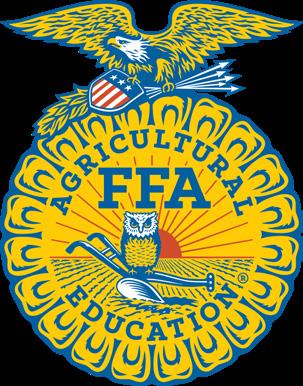
Agricultural proficiency awards honor FFA members who, through their SAEs, have developed specialized skills that they can apply toward their future careers. Students can compete for awards in areas covering everything from Agricultural Communications to Wildlife Management. For more information on these degrees, a full listing of Proficiency Award categories and Career Development Events, visit neaged.org.
Nebraska Career Development Events (CDEs) help students develop abilities to think critically, communicate clearly and develop skills for a competitive job market. Some of the CDEs state-winning individuals and teams will move onto National Convention.
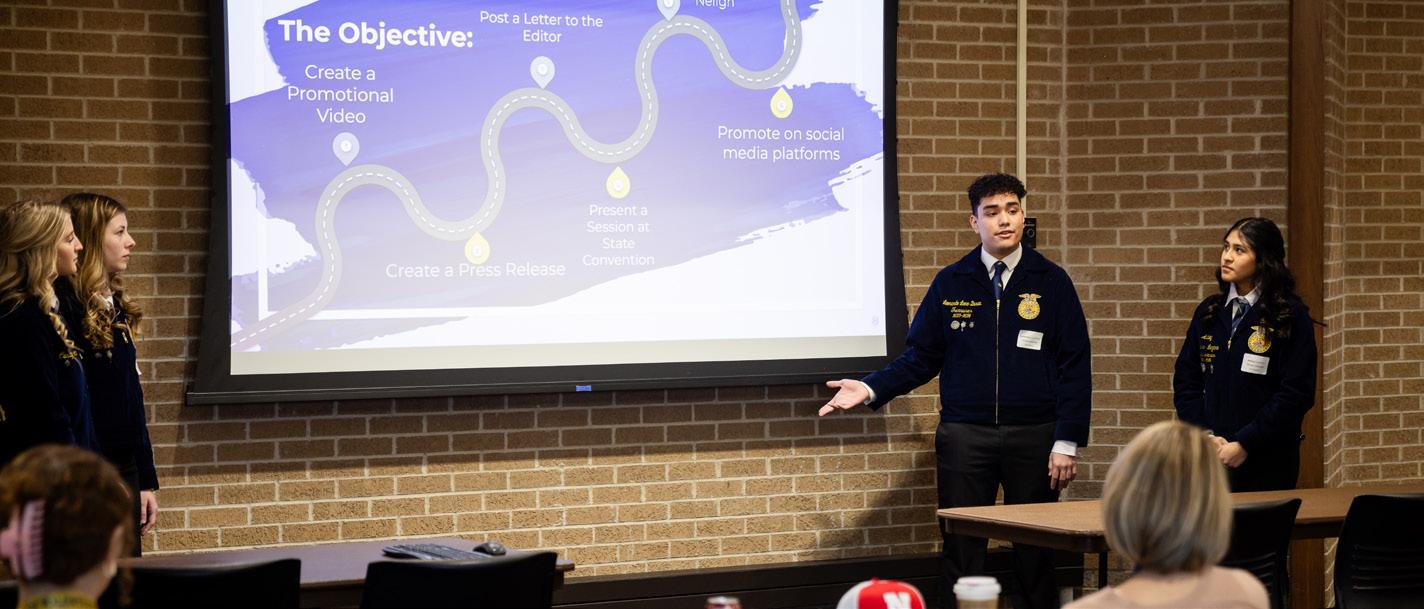
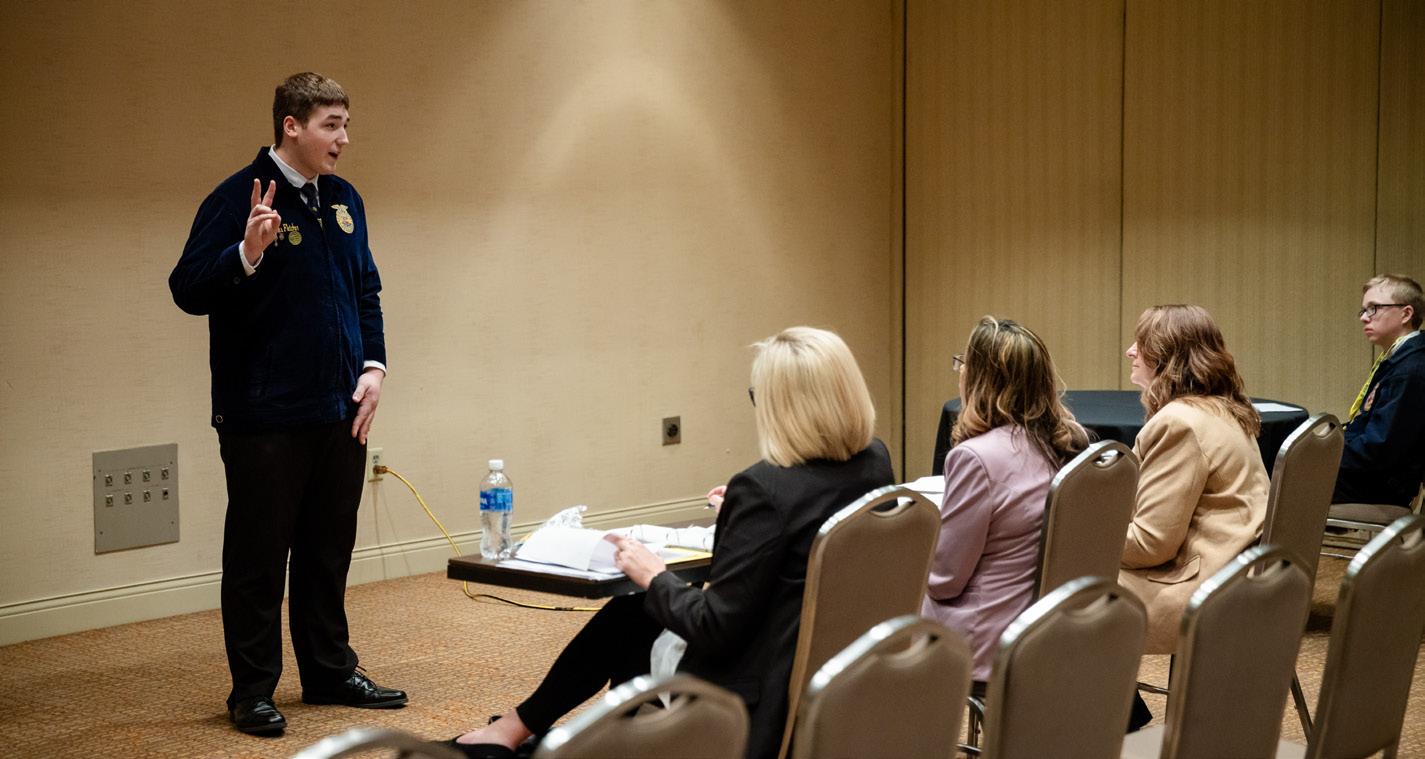
Nebraska Leadership Development Events (LDEs) provide FFA members with experience in the practice of influencing others through speaking and parliamentary procedure competitions. For some LDEs, the state-winning individual or team will represent Nebraska at National FFA Convention.

The State and American Star awards represent the best of the best among thousands of State and American FFA Degree recipients. Finalists for the award have mastered skills in production, finance, management and/or research. State and American Star award areas include: Star in Production, Star in Agribusiness, Star in Agricultural Placement and Star in Agriscience.
All well-run organizations have a plan for activities. FFA chapters develop a Program of Activities (POA) as a way to set goals for the chapter and outline the steps needed to meet those goals.
A well-planned POA will ensure chapter activities meet the needs of its members, provide direction from year to year, lead to a workable budget, provide experience in planning and serve as a reference point throughout the year. A POA also helps chapters communicate their goals with administrators, parents, advisory committees and their community.
By engaging in the development and delivery of a quality POA, students develop leadership and planning skills which are essential in all careers.
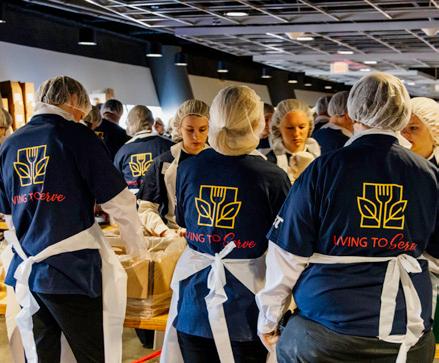
Chapters can earn national recognition for their POA. Each year, there are 10 chapters identified as a National FFA Premier Chapter in each of the three focus areas.
In addition, another ten high school chapters will also be chosen as National FFA Models of Excellence award winners. These chapters exhibit excellence in all three categories of the Program of Activities. This award program recognizes chapters who successfully complete an annual Program of Activities designed to encourage members to work as part of a team, to serve others and to grow as individuals.
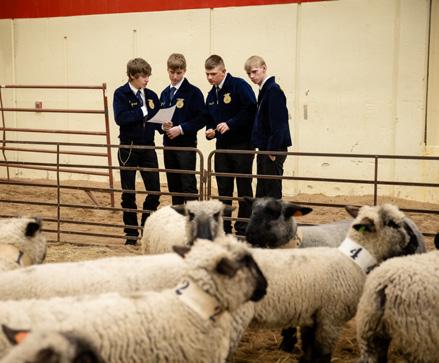


Nebraska FFA Officers commit to a year of service to the association members and agriculture industry. These seven individuals are responsible for facilitating conferences, meetings with business and industry representatives, traveling statewide to FFA chapters, serving as delegates to the National FFA Convention, and much more. The following indivudlas are serving as your 2024/2025 Nebraska State FFA Officers!
STATE PRESIDENT: REAGAN CHOAT
STATE SECRETARY: BRYNN ALMGREN
STATE VICE PRESIDENT: PEYTON HINRICHS
STATE VICE PRESIDENT: ALEXA TOLLMAN
STATE VICE PRESIDENT: CLAIR WOEPPEL
STATE VICE PRESIDENT: CALIE COCKBURN
STATE VICE PRESIDENT: TREY STEWART
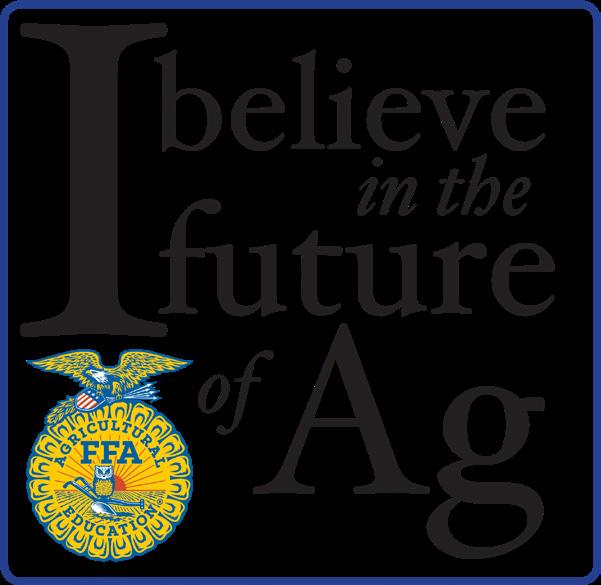
The I Believe in the Future of Ag Campaign allows your local FFA chapter to receive donations and build a supportive FFA community! Local donors can support your chapter directly through the Nebraska FFA Foundation.
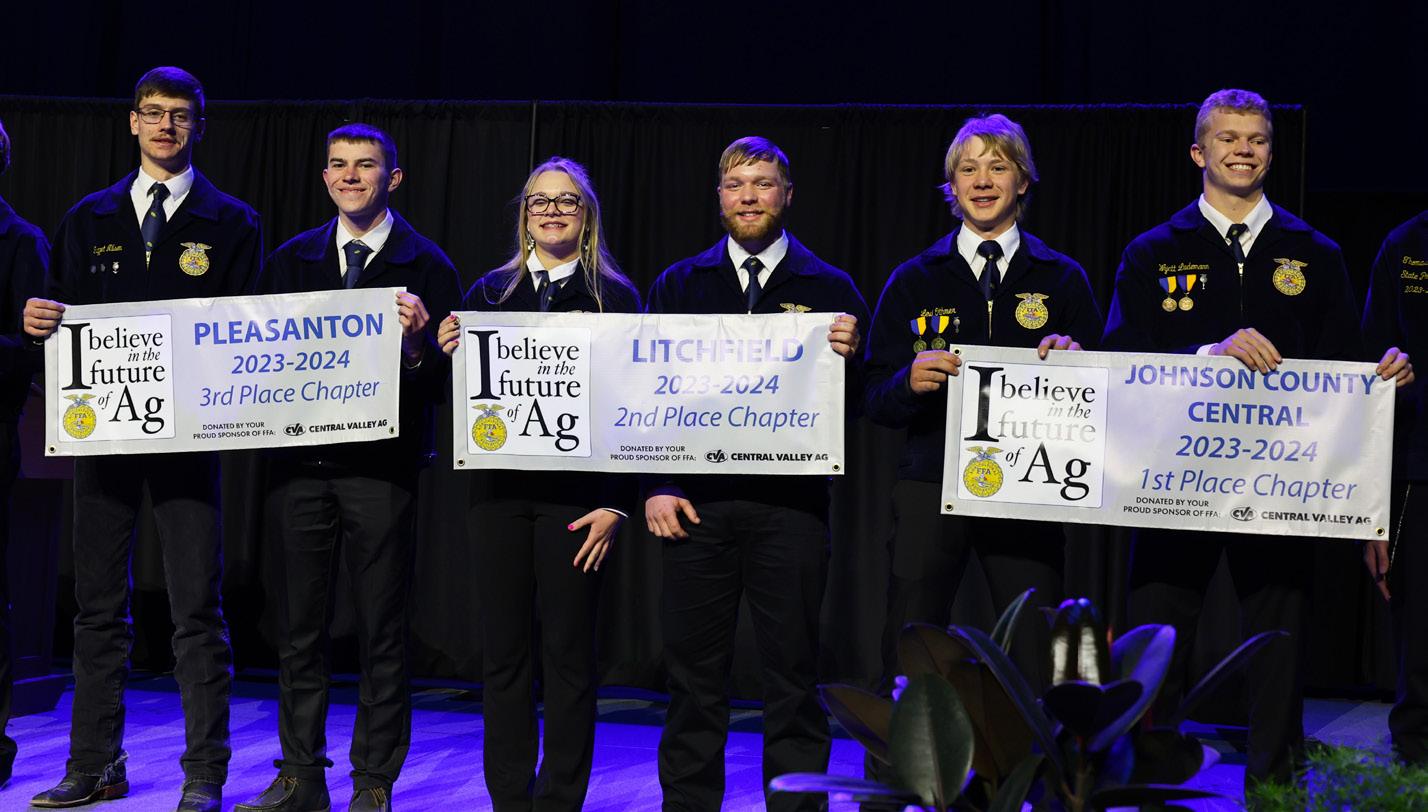
2023/2024 TOP I BELIEVE CHAPTERS
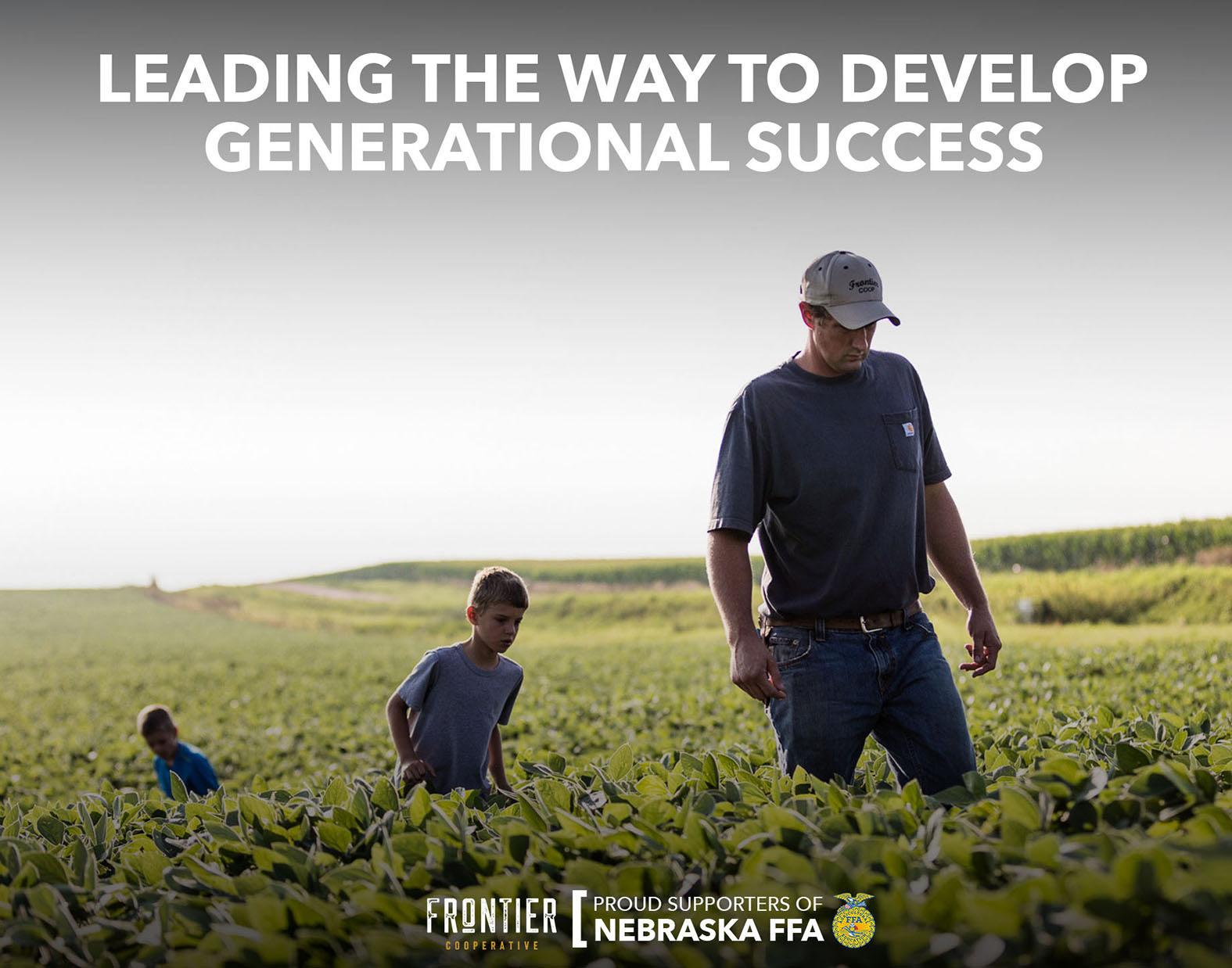



Proud supporter of the next generation of ag producers in Nebraska.







